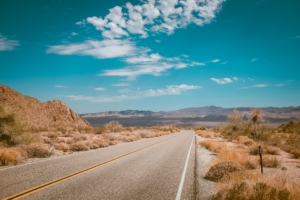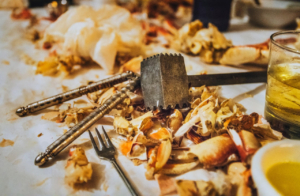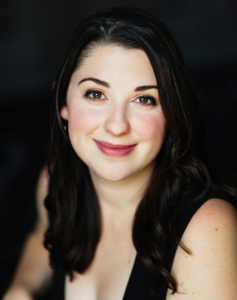Finding Our Similarities

Americans weren’t talking to each other. At least, that’s what the news was constantly saying. It was January 2017. Trump had just been inaugurated as the 45th President of the United States, and our country had never felt so polarized. Purple barely felt like an option anymore. Every person, every issue, was either red or blue.
As the country was in a huge transition, so were my now fiancé, Matt and I. We’d been living in the Colorado mountains for several years and wanted to find the next place to call home. We decided to take a road trip to the West Coast to explore and to show our two-year old puppy Cassius the ocean. We headed left and up, from the Colorado mountains to Las Vegas, then to Los Angeles and from there to Seattle. Along the way, we listened to podcast after podcast that tried to explain Trump’s victory over Clinton, and how there was a segment of the country who wasn’t feeling heard … until now.
As we journeyed northwest, we veered away from most urban destinations, trying to see parts of the country we’d never experienced before. We spent an evening in the small seaside town of Cambria, California, the three of us watching the waves crash down onto rocky shores as the sun set. North of San Francisco, the rolling hills of vineyards and the promise of a delectable meal convinced us to make a stop in Healdsburg, Sonoma County. We decided to bypass Portland and stay in a town way off the beaten path called Clatskanie, Oregon. Located by a river of the same name, the town has less than 2,000 residents and a history steeped in logging that continues even today.
Our stay was brief. On our last night there, we were invited to an annual crab feast by a friend of a friend. Our hosts for the evening were two sisters, Bee and Lou. They grew up in Clatskanie, two of 13 siblings. Several of their brothers and sisters went in together to buy an old, white Victorian house so they could spend more quality time together. They had just remodeled it and were eager to have people over. As two landlocked natives, Matt and I were thrilled at the opportunity to eat seafood, especially with locals who could share their knowledge of the area and help us get a real feel for the town.
As the afternoon turned to evening, we walked from the main street area of town – which was comprised of only a couple of stores, a coffee shop, and a restaurant bar – up a hill into a neighborhood. On the corner of one of the streets sat an old, white Victorian house. There was still enough daylight to see the house’s wrap around porch, the detailed woodwork around the windows, and the lush green yard surrounding the property. We knocked on the front door and were greeted ecastatically by Bee and Lou. Their home was filled with jovial Clatskanie townsfolk, all at least three decades older than Matt and I, who were in our mid-twenties. We came with bottles of wine and giddy smiles, eager to engorge ourselves excessively with Dungeness crab dipped in heaps of melted butter.
As we poured ourselves drinks in the kitchen, one of the first people to introduce themselves was a man in his mid-fifties by the name of Rowdy Lee. Rowdy had a big handlebar mustache across his face. He wore a pair of cowboy boots, a complimentary hat, a button up shirt, a pair of Levi jeans, and, in the center of it all, a large, shiny Confederate flag belt buckle. My eyes got big, and I’m certain the expression on my face turned to one of shock. As a white girl from the Midwest, I’d only seen the Confederate flag in movies. I knew well that the symbol was controversial. Many people who still display the flag say it’s a way to honor their country or state’s heritage. While others see it as an inappropriate symbol, one that recalls the pain and hate of slavery and segregation in the U.S. The issue is an incredibly sensitive one, perhaps even more polarizing than the 2016 election. I’d never seen anyone sporting Confederate flag accoutrements, and I certainly wasn’t expecting to find any in the Northwest corner of the country. I looked at Matt, clothed in skinny jeans and a posh button-down shirt. Me wearing a brightly-colored sweater dress with sleek, black leather boots. Everything about us screamed liberal, artsy hipsters. By this man’s accessory choices, I could tell he was not likeminded to Matt and I, at least not politically. I recalled the podcasts we’d been listening to on our drive. I thought about the answers so many of us were trying to find as to how we’d become so divided as a nation. I matched Rowdy’s big welcoming grin, reached out to him, and shook his hand.

Bee and Lou had setup big tables in their living room for the feast. In place of linens, long sheets of paper covered the tables, so the tasty crustaceans could be placed right on the surface. Everyone seemed overjoyed to be a part of the evening. Most of our fellow crab eaters had grown up in Clatskanie or close by and had known each other for decades. Rowdy was the only one sporting a Confederate flag belt buckle, leaving it unclear where most of the others stood politically. But political affiliations didn’t seem to matter in Bee and Lou’s place. As long as someone showed up ready to indulge in crab and drink, they were welcome.
Once we were all seated for dinner, our two lively hostesses grabbed scores of crabs out of cooler after cooler and threw them on the table in front of us, no plates needed. We were given bibs to keep the liquids at bay and meat tenderizers, pliers, and crab crackers to procure the tender meat from the crab’s hard exterior. Once we had the meat in our hands, we dunked it in one of the large bowls of melted butter on the table and rushed the bites to our salivating mouths. Matt and I looked at each other as butter trickled down our chins. We knew we were experiencing one of the best meals of our lives in that moment.
After eating our way through as many crabs as possible, Bee and Lou gave us a tour of the house, showing us the quaint bedrooms, the interesting pieces of antique furniture and even an old pot still their grandfather used during prohibition.
Throughout the evening, Rowdy Lee remained close by, excited to talk to Matt and me whenever the opportunity presented itself. I’m not sure if it was because we were the youngest or newest people at the party, or maybe he too was looking to build bridges with people who seemed so different from him. We clearly didn’t agree on politics, particularly butting heads when it came to the fate of Confederate statues and the importance, or lack thereof, of political correctness. But we found there were topics we could connect on. We all like tequila and agreed we should be drinking it often. We love being in the outdoors, whether it be for hiking or hunting. And we all have a particular affinity for traveling the open road. He was a trucker who had driven through all 48 continental states, but he grew up in a military family. He watched all of his brothers enlist in the army, but he couldn’t because of a back injury.
By the end of the night – and after more than enough libations – we felt oddly bonded to this man with the Confederate flag belt buckle. None of Matt and my views had changed, and I’m certain none of his had either, but we found common ground in our conversations and our ability to listen to and respect one another, even when we disagreed. Perhaps this is one of the reasons our country has become so polarized, we’ve stopped listening to each other.
Some time after our exploratory road trip, Matt and I decided to move to Los Angeles, a bubble all of its own. We still recall our time at Bee and Lou’s house fondly, chatting away the evening with Rowdy and the rest of the Clatskanie locals. At that time, when we were trying to understand how an election had turned out so differently than we expected, Rowdy was able to give us an understanding into why.
When we can, Matt and I try to get out of our bubble and put ourselves in more situations like the one in Clatskanie, Oregon. We take the long way on road trips, hoping to meet more Americans and find experiences that alter our realities. We usually find people who are eager to talk about everything from tequila to political correctness, no matter who they voted for in the 2016 election, no matter if they consider themselves to be red, blue, or purple. The conversations aren’t always easy going, but they’re worth having. Because, ultimately, they remind me that our similarities as Americans, as human beings, are much stronger than our differences.
Barbara Platts is an award-winning columnist and the online editor for Sweet Jane Magazine. She’s worked in many forms of journalism, from public radio to newspaper, and is thrilled to be pursuing her MFA for nonfiction writing at Antioch University. She lives in Los Angeles with her fiancé and two adorable pups. Follow her on Twitter and Instagram @BarbaraPlatts.





